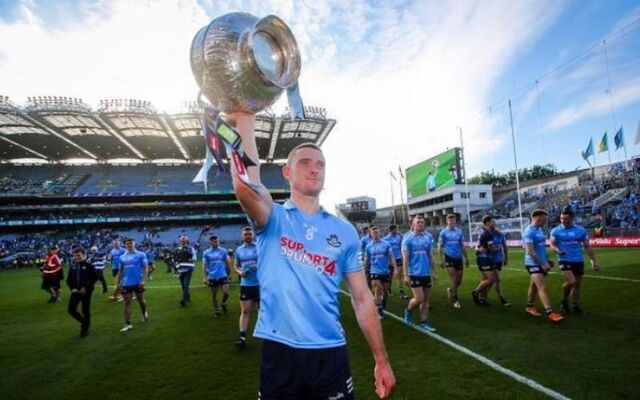Little did anyone know then that it was one of the last times he would be seen in a Dublin senior football jersey. If this was the equivalent of a rock-n-roll star on a farewell tour, nobody had thought to announce that this was part of a select series of final dates.
For this round-two game in Group 2 of the All-Ireland series, it was possible to drive up to the Cavan venue and park behind the main stand and wonder if this was actually a fixture in the race to lift the Sam Maguire Cup. Right then, it felt more akin to a slow-bicycle race where the lack of jeopardy served only to jeopardize the attendance.
On a Bank Holiday weekend when supporters all over the country perhaps had other options to occupy them, the GAA took the cynical option of putting out a press release announcing a ticket price increase late on the Friday afternoon. The ‘something for everyone in the audience’ element to a group stage where three from four progress only seemed to undercut the importance of the action.
By virtue of an opening-round win over Roscommon in front of a small crowd at Croke Park, there was the sense that Dublin were going to coast into the knock-out stages. Such is the level of the county’s dominance – a 14th Leinster title in a row had been secured – even the usual band of Hill 16-on-tour supporters were thin on the ground.
With seven All-Irelands and 10 Leinsters to his name, and Mayo looming in a fortnight’s time in the final round, the two-time Footballer of the Year could have been forgiven for going through the motions. It said everything about his talent and personality that he put on a masterclass in the first half to help bury Cavan to the tune of 2-9 to 0-7.
Read more
Fenton burned Killian Brady and left three opposition players for dead to put Dublin ahead early on. His team’s first goal came from his aerial ability and in-game smarts, breaking a speculative long punt down to a teammate. He cut a familiar figure, cruising through a gap in the middle that didn’t seem to be there seconds earlier, his right foot snapshot flying up and over after hitting the top of the crossbar.
He was a player who looked to be at the peak of his powers.
For Dublin supporters, the shock news in midweek that he was gone must have felt like their own JFK moment, the kind of jolt that will cause them to remember where they were when they heard that his decade in blue, spanning Dublin’s Golden Years, was at an end.
Because it seemed like Fenton – and this modern Dublin empire – would continue on indefinitely to win or challenge for All-Irelands.

Love GAA? Share your local GAA and keep in touch with the community around the world on our Global Irish GAA group.
When James McCarthy went, he was rightly showered with plaudits. A warrior figure, the son of John McCarthy seemed to bottle the spirit of the Heffo generation and bring it to a new audience. But he was 34, 15 years on the go, and fighting an ongoing struggle against injury. The case for being Dublin’s finest outfield player is such a strong one, having started in each of Dublin’s 11 All-Ireland finals, including replays, since the breakthrough of 2011.
If Ballymun’s finest was all heart and soul, Fenton was Gaelic football’s beautiful mind. The Raheny man had that instinctive ability to see patterns in chaos.
Here was someone who seemed to describe the laws of midfield play. He was the natural heir to Jack O’Shea in his graceful movement and liquid hands and feet – especially for a player stretching 6’4″.
News of Chrissy McKaigue’s retirement as a Derry senior footballer broke the same day as Fenton.
Taken with McCarthy, the three players captured so much that is good about the game. They had that mix of leadership, ability and big-game mentality that elevated the players around them.
The question for Dublin now is whether a tipping point has been reached.
When Dublin were winning, it looked like an eternal cycle. Must have felt like that for every other county in Leinster.
But that line about the decline of the Roman Empire doesn’t exactly apply here. Because in empire terms, Dublin have more troops than anyone else (in terms of a population base to pull from). They have that protected status in terms of financial backing for coaching and games development that guarantees so much good work is being done on the ground.
When Dublin were winning year-on-year, the debate over off-field advantages became tumbled up in the narrative.
For so long, Dublin’s football dominance stretched like a pyramid into the sky. No matter the elements or the winds of change or the passing of time.
Now, with Fenton’s retirement, comes the sudden feeling that this towering silhouette perhaps had a feel of a Jenga tower about it. After McCarthy being removed, with the odds against a 43-year-old Stephen Cluxton returning for 2025 and speculation over plenty more like Jack McCaffrey, Paul Mannion and John Small, is Fenton the piece to bring a period of unprecedented dominance tumbling down?
Up until this, it seemed that players could be removed at different intervals with no discernible wobble in the foundations. And the ultimate in A-list players too. Players like Alan and Bernard Brogan, footballers of the Year; four-in-a-row All-Star Paul Flynn; the gifted, mercurial Diarmuid Connolly.
Or take someone like Cian O’Sullivan. Similar to Fenton, he had the same kind of Rolls Royce capacity to glide across the Croke Park pitch, like that trick of the lens when a fast car is filmed and the wheels seem to be going backward at top speed. Custom-fit for that sweeper or plus one role, he inhabited a specialist role that you imagined few could pull off in the same way.
But Dublin shapeshifted to find a way to seamlessly manage his retirement.
Same for Dessie Farrell. His greatest trick was to make the six-in-a-row look easy. To make the transition from five-in-a-row’s Jim Gavin, Dublin’s most successful manager in history, look seamless.
But Fenton’s retirement – to go with McCarthy’s – has quickly changed the narrative.
There was even a bit of chatter this week that – shock horror – Leinster might even be competitive next year.
This leaves you to wonder – was it a golden generation all along?
* This article was originally published on Extra.ie.




Comments